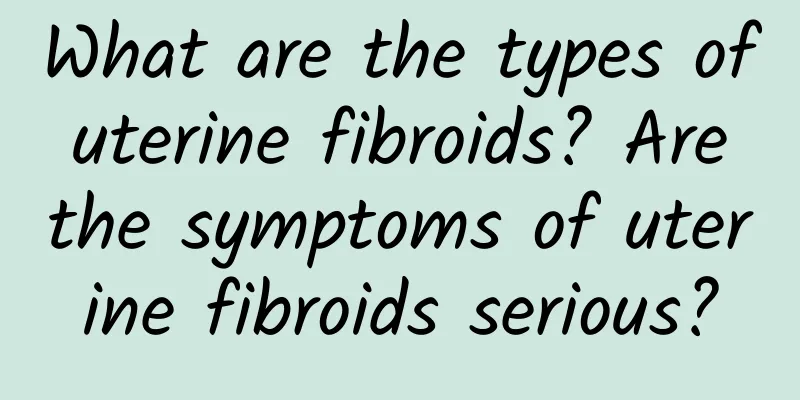What are the types of uterine fibroids? Are the symptoms of uterine fibroids serious?

|
The occurrence of uterine fibroids has always been the most troublesome problem for women, for various diseases. So, what are the symptoms of uterine fibroids, and is the condition serious? Uterine fibroids appear as solid spherical masses with a smooth surface and a harder texture than the myometrium, with a clear boundary from the surrounding muscle tissue. The fibroids compress the surrounding muscle wall fibers to form a pseudocapsule, and there is a loose mesh gap between the fibroids and the pseudocapsule. After cutting the pseudocapsule, the fibroids can protrude on their own. Uterine fibroids mainly depend on the location, size, number and complications of the fibroids. Some fibroids are small, grow slowly, are asymptomatic, and cannot be found throughout life. In recent years, due to the widespread use of B-ultrasound examinations, many patients have found uterine fibroids through B-ultrasound examinations during routine physical examinations. Most patients seek medical treatment due to symptoms. Common symptoms of uterine fibroids include uterine bleeding, abdominal masses, vaginal discharge, compression, etc. There are three symptoms of uterine fibroids: 1. Menstrual changes: When the fibroids continue to grow, the volume of the uterus will also increase accordingly, thus disrupting the normal physiological function of the uterus. Since the growth of the tumor affects the hemostatic function of the uterus during menstruation, it is often manifested as shortened menstrual cycles, increased menstrual volume, prolonged menstruation, irregular vaginal bleeding, etc. If the patient has excessive menstruation for a long time, it may lead to secondary symptoms such as anemia, general fatigue, pale complexion, shortness of breath, palpitations, etc. 2. Abdominal mass: During the growth of uterine fibroids, patients can feel abdominal swelling, and the lower abdominal tumor is large enough to touch, especially in the morning before getting up to urinate. As the bladder is full, the uterus moves upward and is more likely to touch the fibroids. This feeling becomes gradually more obvious as the uterine fibroids grow. 3. Increased leucorrhea: Uterine fibroids can cause pelvic congestion and infection, which in turn leads to increased vaginal flow, which is mixed with traditional leucorrhea to increase secretion. Most leucorrhea is purulent and has a fishy smell. |
<<: Symptoms of uterine fibroids. Will uterine fibroids cause abnormal leucorrhea?
>>: Are the symptoms of uterine fibroids obvious? Can uterine fibroids also cause anemia?
Recommend
What medicine should I take for functional uterine bleeding?
Functional uterine bleeding in modern medicine is...
Why are lonely women more prone to amenorrhea?
Some studies have shown that women with introspec...
Two misunderstandings about ovarian cysts
Ovarian cysts are common and frequently occurring...
Endocrine disorders may be the cause of vulvar leukoplakia
The cause of vulvar leukoplakia is quite complica...
I rarely have my period, I'm a bit scared, is there any way to change it?
I am a little scared of having very rare periods....
What causes cervical hypertrophy?
What are the causes of cervical hypertrophy? Do y...
National Health Bureau: More than 40% of adults gained an average of 1.7 kg after the Chinese New Year
The nine-day Lunar New Year holiday has ended, an...
Can I have a normal birth after undergoing surgery for cervical erosion? How to treat cervical erosion?
After cervical erosion surgery, scars may be left...
Experts specifically introduce common symptoms of cervical hypertrophy
For female friends, if they want to treat cervica...
What are the causes of uterine fibroids? Endocrine disorders can cause uterine fibroids
We have always believed that uterine fibroids are...
The treatment of patients with cervicitis must be combined with their clinical manifestations
In my country, more and more women suffer from ce...
What are the causes of adnexitis?
Adnexitis causes serious harm to women's bodi...
How can patients with congenital absence of vagina take care of themselves?
How do patients with congenital absence of vagina...
Important treatment methods for threatened abortion
Threatened abortion is a signal of impending misc...
See how Chinese medicine can solve dysmenorrhea and how to treat it
"How to treat dysmenorrhea" is a topic ...









